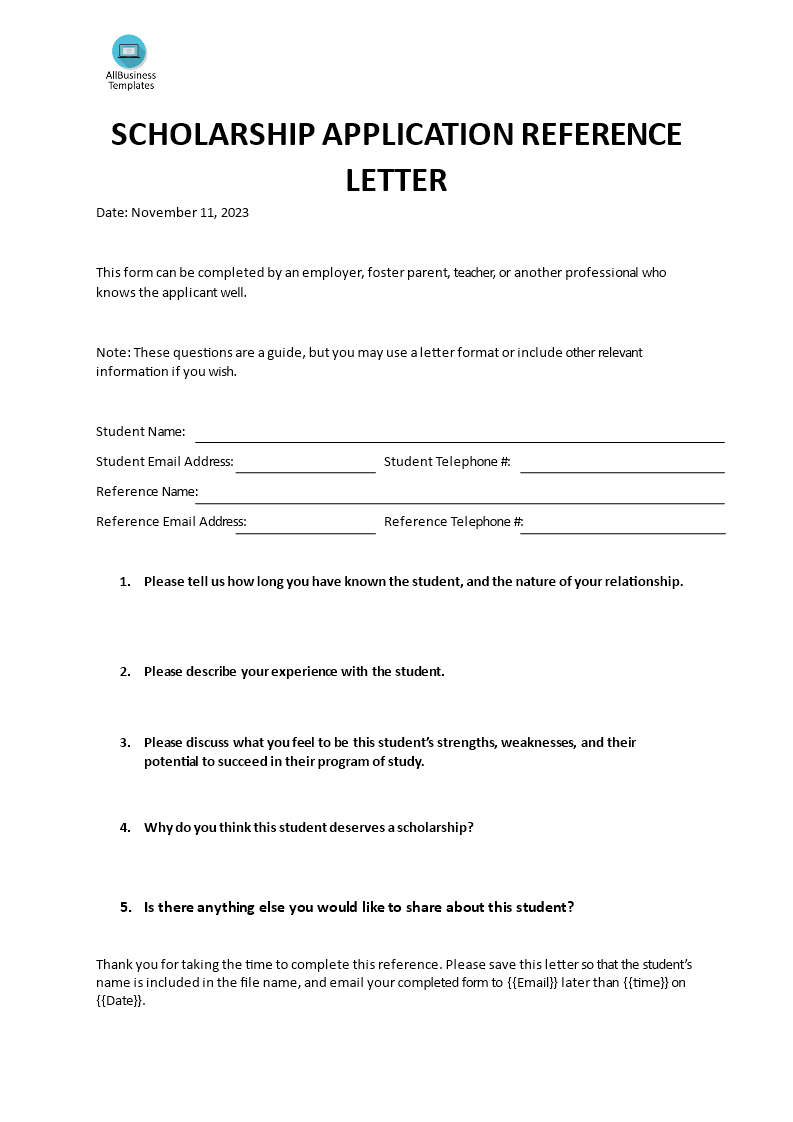Scholarship Application Reference Letter
Save, fill-In The Blanks, Print, Done!

Download Scholarship Application Reference Letter
Microsoft Word (.docx)Or select the format you want and we convert it for you for free:
- This Document Has Been Certified by a Professional
- 100% customizable
- This is a digital download (36.22 kB)
- Language: English
- We recommend downloading this file onto your computer.
How to make a Scholarship Application Reference Letter? What should I include in my scholarship application letter? Our sample template includes information about the applicant's qualifications, accomplishments, and goals. It should also include a statement from the recommender and a signature. Download this scholarship application reference letter template that will perfectly suit your needs!
A scholarship application reference letter is a document written by someone who knows you well and can speak to your academic achievements, personal qualities, and potential for success. This letter is typically required as part of a scholarship application process and is submitted by someone who can provide a credible and positive assessment of your qualifications.
Key components of a scholarship application reference letter may include:
- Introduction:
- The letter should start with a formal introduction, including the writer's name, title, and affiliation (if applicable).
- Description of Relationship:
- The writer should explain how they know the applicant and the context of their relationship. This could be a teacher, professor, employer, mentor, or someone else who has observed the applicant's abilities.
- Length of Relationship:
- Mention how long the writer has known the applicant. This adds credibility to their observations.
- Academic Achievements:
- Discuss the applicant's academic achievements, such as grades, coursework, class participation, and any other relevant academic accomplishments.
- Personal Qualities:
- Describe the applicant's personal qualities, character, and work ethic. Highlight any specific examples or anecdotes that demonstrate these qualities.
- Leadership and Extracurricular Activities:
- If applicable, mention the applicant's involvement in extracurricular activities, leadership roles, community service, or any other relevant experiences outside the classroom.
- Career Goals and Aspirations:
- Discuss the applicant's career goals and aspirations, showing how the scholarship aligns with their plans and how they have demonstrated commitment and passion in their chosen field.
- Unique Contributions:
- Highlight any unique contributions or qualities that make the applicant stand out. This could include special talents, skills, or experiences.
- Closing Statement:
- Conclude the letter by summarizing why the applicant is a strong candidate for the scholarship and expressing confidence in their future success.
- Contact Information:
- Include the writer's contact information in case the scholarship committee has any follow-up questions.
It's crucial to choose someone who can provide a genuine and positive recommendation. This might be a teacher, professor, employer, or another individual who has observed your abilities and potential. Be sure to provide the person writing the reference letter with all necessary information about the scholarship and any specific points you would like them to address. Additionally, it's essential to give them ample time to write the letter before the application deadline.
DISCLAIMER
Nothing on this site shall be considered legal advice and no attorney-client relationship is established.
Leave a Reply. If you have any questions or remarks, feel free to post them below.
Reference Letters
How to write a personal reference letter? How are professional references different from character references? Check out several professional reference letters here.
Read moreRelated templates
Latest templates
Latest topics
- Excel Templates
Where do I find templates for Excel? How do I create a template in Excel? Check these editable and printable Excel Templates and download them directly! - GDPR Compliance Templates
What do you need to become GDPR compliant? Are you looking for useful GDPR document templates to make you compliant? All these compliance documents will be available to download instantly... - Google Docs Templates
How to create documents in Google Docs? We provide Google Docs compatible template and these are the reasons why it's useful to work with Google Docs... - IT Security Standards Kit
What are IT Security Standards? Check out our collection of this newly updated IT Security Kit Standard templates, including policies, controls, processes, checklists, procedures and other documents. - Letter Format
How to format a letter? Here is a brief overview of common letter formats and templates in USA and UK and get inspirited immediately!
cheese

